word choice--verbs(2)
WORD CHOICE
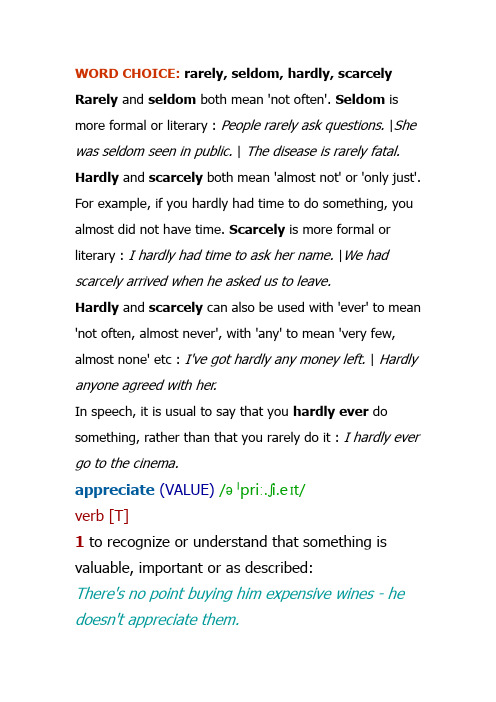
WORD CHOICE: rarely, seldom, hardly, scarcely Rarely and seldom both mean 'not often'. Seldom is more formal or literary : People rarely ask questions. |She was seldom seen in public. | The disease is rarely fatal. Hardly and scarcely both mean 'almost not' or 'only just'. For example, if you hardly had time to do something, you almost did not have time. Scarcely is more formal or literary : I hardly had time to ask her name. |We had scarcely arrived when he asked us to leave.Hardly and scarcely can also be used with 'ever' to mean 'not often, almost never', with 'any' to mean 'very few, almost none' etc : I've got hardly any money left. | Hardly anyone agreed with her.In speech, it is usual to say that you hardly ever do something, rather than that you rarely do it : I hardly ever go to the cinema.appreciate(VALUE)/əˈpriː.ʃi.eɪt/verb[T]1 to recognize or understand that something is valuable, important or as described:There's no point buying him expensive wines - he doesn't appreciate them.We appreciate the need for immediate action.[+ that] I appreciate that it's a difficult decision for you to make.[+ question word] I don't think you appreciate how much time I spent preparing this meal.2I/We appreciate... used when you are thanking someone or showing that you are grateful:We really appreciate all the help you gave us last weekend.[+ ing form of verb] I appreciate your mak ing the effort to come.3would appreciate used when you are politely requesting something:I would appreciate it if you could let me know (= Please let me know) in advance whether or not you will be coming.not be much of a sthto not be a good example of something or not be very good at somethingI'm not much of a dancer, I'm afraid.It wasn't really much of a storm.come about phr vto happen, especially in a way that is not plannedThe opportunity to get into computing came about quite by accident.I don't know how this confusion has come about.if a ship comes about, it changes directioncome across phr vcome across sb/sthto meet, find, or discover someone or something by chanceI came across an old diary in her desk.I've never come across anyone quite like her before.if an idea comes across well, it is easy for people to understandYour point really came across at the meeting.if someone comes across in a particular way, they seem to have particular qualities= come over come across asHe comes across as a very intelligent, sensitive man.She sometimes comes across as being rather arrogant.I don't think I came across very well (=seemed to have good qualities) in the interview.come across with [come across with sth] phr vto provide money or information when it is neededI hoped he might come across with a few facts.come after [come after sb] phr vto look for someone in order to hurt them, punish them, or get something from themShe was terrified that Trevor would come after her. come along phr vbe coming along informalto be developing or making progress= progressHe opened the oven door to see how the food was coming along.Your English is coming along really well.to appear or arriveA bus should come along any minute now.Take any job opportunity that comes along.a) to go to a place with someoneWe're going into town - do you want to come along? b) to go somewhere after someoneYou go on ahead - I'll come along later.come along!a) used to tell someone to hurry up= come onCome along! We're all waiting for you!b) used to encourage someone to try harder= come onCome along! Don't give up yet!come apart phr vto split or fall into piecesI picked the magazine up and it came apart in my hands. to begin to failThe whole basis of the agreement was coming apart.She felt as if her life was coming apart at the seams (=failing completely) .come around phr valso come round BrEto come to someone's home or the place where they work in order to visit them= come overI'll come around later and see how you are.Why don't you come round for lunch?also come round BrEto change your opinion so that you now agree with someone or are no longer angry with themcome around toIt took him a while to come around to the idea.Don't worry - she'll come round eventually.also come round BrEif a regular event comes around, it happens as usual By the time the summer came around, Kelly was feeling much better.AmE to become conscious again after you have been unconsciousBritish Equivalent: come roundWhen she came around her mother was sitting by her bed.come around fromYou might feel a little sick when you come around from the anesthetic.come at / [come at sb/sth] phr vto move towards someone in a threatening waySuddenly, he came at me with a knife.if images, questions, facts etc come at you, you feelconfused because there are too many of them at the same timeQuestions were coming at me from all directions. informal to consider or deal with a problem in a particular way= approachWe need to come at the problem from a different angle. come away phr vto become separated from the main part of something = come offOne of the wires in the plug had come away.I turned some of the pages and they came away in my hand.to leave a place with a particular feeling or ideaWe came away thinking that we had done quite well. come away withI came away with the impression that the school was very well run.come back phr vto return to a particular place or person= returnMy mother was scared that if I left home I'd never comeGinny's left me, and there's nothing I can do to persuade her to come back.to become fashionable or popular again→comebackWho'd have thought hippy gear would ever come back!High heels are coming back into fashion .to appear or start to affect someone or something again = returnThe pain in her shoulder was coming back again.It took a while for my confidence to come back.if something comes back to you, you remember it or remember how to do itAs I walked the city streets that evening, the memories came flooding back.come back toI can't think of her name at the moment, but it'll come back to me.to reply to someone quickly, often in an angry or unkind way→comeback come back atHe came back at me immediately, accusing me of beingcome before / [come before sb/sth] phr vto be brought to someone in authority, especially a judge in a law court, to be judged or discussed by themWhen you come before the judge, it's best to tell the whole truth.The case is due to come before the courts next month. come between [come between sb] phr vto make people argue and feel angry with each other, when they had been friends beforeNothing will ever come between us now.I didn't want to come between a husband and wife.to prevent someone from giving enough attention to somethingShe never let anything come between her and her work. come by phr vcome by sthto manage to get something that is rare or difficult to get How did you come by these pictures?Jobs were hard to come by .come by (sth)to make a short visit to a place on your way to somewhereHe said he'd come by later.I'll come by the house and get my stuff later, OK? come down phr va) if a price, level etc comes down, it gets lowerIt looks as if interest rates will come down again this month.b) to accept a lower pricecome down toHe's asking £5000, but he may be willing to come down to £4800.if someone comes down to a place, they travel south to the place where you areWhy don't you come down for the weekend sometime? come down toAre you coming down to Knoxville for Christmas?to fall to the groundA lot of trees came down in the storm.We were still out in the fields when the rain started coming down.come down on the side of sb/sth also come down in favour of sb/sthto decide to support someone or somethingThe committee came down in favour of making the information public.informal to start to feel normal again after you have been feeling very happy and excitedHe was on a real high all last week and he's only just come down.informal to stop feeling the effects of a strong drugWhen I came down, I remembered with horror some of the things I'd said.BrE old-fashioned to leave a university after completing a period of studycome down on [come down on sb] phr vto punish someone or criticize them severelyWe need to come down hard on young offenders.I made the mistake of answering back, and she came down on me like a ton of bricks (=very severely) . come down to / [come down to sb/sth] phr vif a complicated situation or problem comes down to something, that is the single most important thing It all comes down to money in the end.if something old has come down to you, it has beenpassed between people over a long period of time until you have itThe text which has come down to us is only a fragment of the original.come down with [come down with sth] phr vto get an illnessI think I'm coming down with a cold.come for / [come for sb/sth] phr vto arrive to collect someone or somethingI'll come for you at about eight o'clock.to arrive at a place in order to take someone away by forceMembers of the secret police came for him in the middle of the night.come forward phr vto offer help to someone, or offer to do something So far, only one candidate has come forward.The police are appealing for more witnesses to come forward with information.come from / [come from sb/sth] phr vif you come from a place, you were born there or lived there when you were youngI come from London originally.to be obtained from a place, thing, or person, or to start or be made somewhereA lot of drugs come from quite common plants.My information comes from a very reputable source.The idea came from America.to happen as the result of doing somethingcome from doing sthMost of her problems come from expecting too much of people.coming from him/her/you etcspoken used to say that someone should not criticize another person for doing something, because they have done the same thing themselvesYou think I'm too selfish? That's rich coming from you! where sb is coming from informalthe basic attitude or opinion someone has, which influences what they think, say, or doI can see where you're coming from now.come in phr vif a train, bus, plane, or ship comes in, it arrives at a place What time does your train come in?come in toWe come in to Heathrow at nine in the morning.if money or information comes in, you receive itReports are coming in of a massive earthquake in Mexico.We haven't got enough money coming in.to be involved in a plan, deal etcWe need some financial advice - that's where Kate comes in.come in onYou had the chance to come in on the deal.to join in a conversation or discussionCan I come in here and add something to what you're saying?to become fashionable or popular≠ go outTrainers really became popular in the 1980s, when casual sportswear came in.to finish a racecome in first/second etcHis horse came in second to last.if the tide comes in, the sea moves towards the land andcovers the edge of it≠ go outcome in for [come in for sth] phr vcome in for criticism/blame/scrutinyto be criticized, blamed etc for somethingThe government has come in for fierce criticism over its handling of this affair.come into [come into sth] phr vto receive money, land, or property from someone after they have diedShe'll come into quite a lot of money when her father dies.to be involved in somethingJosie doesn't come into the movie until quite near the end.Where do I come into all this?come into view/sightif something comes into view, you begin to see it The mountains were just coming into view.come into leaf/flower/blossomto start to produce leaves or flowersThe early roses were just coming into flower.not come into itspoken used to say that something is not important Money doesn't really come into it.come into your ownto become very good, useful, or important in a particular situationOn icy roads, a four-wheel drive vehicle really comes into its own.come of [come of sth] phr vto happen as a result of somethingI did ask a few questions, but nothing came of it.That's what comes of not practising - you've forgotten everything!come off phr vcome off (sth)to become removed from somethingThe label had come off, so there was no way of knowing what was on the disk.come off (sth)BrE to fall off somethingDyson came off his bike as he rounded the last corner, but wasn't badly hurt.informal if something that has been planned comes off, it happensIn the end the trip never came off.informal to be successfulIt was a good idea, but it didn't quite come off.The performance on the first night came off pretty well .come off sthto stop taking a drug that you have been taking regularly It wasn't until I tried to come off the pills that I realized I was addicted.come off best/better/worst etcBrE to gain or lose the most, more, the least etc from a situationAs far as pensions go, it's still women who come off worst.come off it!BrE spoken used to tell someone that you do not believe what they are sayingOh come off it! You can't seriously be saying you knew nothing about any of this.come on phr vcome on!spoken a) used to tell someone to hurryCome on, we'll be late!b) used to encourage someone to do somethingCome on, you can do it!Come on, cheer up!c) used to tell someone that you know that what they have just said was not true or rightOh come on, don't lie!d) used to make someone angry enough to want to fight youCome on, then, hit me!come on in/over/up etcspoken used to tell someone to come in, over, up etc, usually in a friendly wayCome on in - I've made some coffee.if a light or machine comes on, it starts workingA dog started barking and lights came on in the house. if an illness comes on, you start to be ill with itI can feel a headache coming on.if a television or radio programme comes on, it startsJust at that moment, the news came on.if rain or snow comes on, it startsThe rain came on just before lunchtime.to come onto a stage or sports fieldHe scored only two minutes after he'd come on.to improve or make progressThe children are really coming on now.Your English is coming on really well.come on sb/sthto find or discover someone or something by chance We came on a group of students having a picnic. come on strong informalto make it very clear to someone that you think they are sexually attractivecome on to / [come on to sb/sth] phr vto start talking about a new subjectI'll come on to this question in a few moments. informal if someone comes on to another person, they make it very clear that they are sexually interested in them →come-onThe way she was coming on to Jack, I'm amazed he managed to get out alive!come out phr vif something comes out, it is removed from a placeThese stains will never come out!if information comes out, people learn about it, especially after it has been kept secretNo doubt the truth will come out one day.It's come out that several ministers received payments from the company.if a photograph comes out, it shows a clear pictureI took loads of photographs, but most of them didn't come out.Some of the wedding photos have come out really well. if a book, record etc comes out, it becomes publicly availableWhen is the new edition coming out?if something comes out in a particular way, that is what it is like after it has been made or producedI've made a cake, but it hasn't come out very well.The cover has come out a bit too big.if something you say comes out in a particular way, that is how it sounds or how it is understoodHis words came out as little more than a whisper.That didn't come out the way I meant it to.I tried to explain everything to her, but it came out all wrong (=not in the way I intended) .if someone comes out in a particular way, that is the situation they are in at the end of an event or series of eventsThe more experienced team came out on top.come out ofShe came out of the divorce quite well.to be easy to noticeHis right-wing opinions come out quite strongly in his later writings.to say publicly that you strongly support or oppose a plan, belief etccome out in favour ofThe board of directors has come out strongly in favour of a merger.come out againstTeachers have come out against the proposed changes.At least he's got the courage to come out and say what he thinks.if the sun, moon, or stars come out, they appear in the skyThe sky cleared and the sun came out.if a flower comes out, it opensThe snowdrops were just starting to come out.if someone comes out, they say that they are gay when this was a secret beforecome out toThat summer, I decided to come out to my parents. BrE informal to refuse to work, as a protestNurses have threatened to come out in support of their pay claim.We decided to come out on strike .if a young woman came out in the past, she was formally introduced into upper class society at a large formal dance come out at [come out at sth] phr vif something comes out at a particular amount, that is the amount it adds up toThe whole trip, including fares, comes out at $900. come out in [come out in sth] phr vcome out in spots/a rash etcif you come out in spots etc, spots appear on your body If I eat eggs, I come out in a rash.come out of [come out of sth] phr vto no longer be in a bad situationThere are signs that the country is coming out of recession.to happen as a result of somethingOne or two excellent ideas came out of the meeting. come out of yourself informalto start to behave in a more confident wayPenny's really come out of herself since she started that course.come out with [come out with sth] phr vto say something, especially something unusual or unexpectedSome of the things he comes out with are so funny! come over phr va) if someone comes over, they visit you at your houseDo you want to come over on Friday evening?b) if someone comes over, they come to the country where you arecome over to/fromWhen did your family first come over to America? come over sbif a strong feeling comes over you, you suddenly experienceitA wave of sleepiness came over me.I'm sorry about that - I don't know what came over me (=I do not know why I behaved in that way) .if an idea comes over well, people can understand it easilyI thought that the points he was making came over quite clearly.if someone comes over in a particular way, they seem to have particular qualities= come acrossHe didn't come over very well (=seem to have good qualities) in the interview.come over asShe comes over as a very efficient businesswoman. come over (all) shy/nervous etc informalto suddenly become very shy, nervous etccome round phr vto come aroundcome through phr vif a piece of information, news etc comes through, it arrives somewhereWe're still waiting for our exam results to come through.There is news just coming through of an explosion in a chemical factory.to be made official, especially by having the correct documents officially approvedI'm still waiting for my divorce to come through.come through (sth)to continue to live, be strong, or succeed after a difficult or dangerous timeIf he comes through the operation OK he should be back to normal within a few weeks.It's been a tough time, but I'm sure you'll come through and be all the wiser for it.come through with [come through with sth] phr vto give someone something they need, especially when they have been worried that you would not produce it in timeOur representative in Hong Kong finally came through with the figures.come to phr vcome to a decision/conclusion/agreement etcto decide something, agree on something etc afterconsidering or discussing a situation= reachWe came to the conclusion that there was no other way back to the camp.If they don't come to a decision by midnight, the talks will be abandoned.come to a halt/stopa) to slow down and stop= stopThe train came to a stop just yards from the barrier. b) to stop operating or continuingAfter the election our funding came to an abrupt halt. come to sthto develop so that a particular situation exists, usually a bad oneI never thought it would come to this .We need to be prepared to fight, but hopefully it won't come to that (=that won't be necessary) .All those years of studying, and in the end it all came to nothing .It's come to something when I'm not allowed to express an opinion in my own house!what is the world/the country etc coming to?(=used to say that the world etc is in a bad situation) come to sthto add up to a total amountThat comes to £23.50.The bill came to £48.50.come to sbif a thought or idea comes to you, you realize or remember somethingThe answer came to me in a flash.I've forgotten her name, but maybe it'll come to me later. to become conscious again after you have been unconsciousWhen he came to, he was lying on the floor with his hands tied behind his back.when it comes to sth informalwhen you are dealing with something or talking about somethingHe's a bit of an expert when it comes to computers. come under [come under sth] phr vcome under attack/fire/scrutiny etcto be attacked, shot at etcThe government has come under attack from opposition leaders over proposals to cut health spending.to be governed or controlled by a particular organization or personThe organization comes under the authority of the EU. if a piece of information comes under a particular title, you can find it under that titleThe proposals come under three main headings. come up phr vif someone comes up to you, they come close to you, especially in order to speak to youOne of the teachers came up and started talking to me. come up toA man came up to him and asked for a light.if someone comes up to a place, they travel north to the place where you arecome up toWhy don't you come up to New York for the weekend? if a subject comes up, people mention it and discuss it = ariseHis name came up in the conversation.The subject of salaries didn't come up.if a problem or difficulty comes up, it appears or starts to affect you= ariseI'm afraid I'll have to cancel our date - something's come up .The same problems come up every time.if a job or an opportunity comes up, it becomes availableA vacancy has come up in the accounts department.to be dealt with in a law courtYour case comes up next week.be coming upto be going to happen soonWith Christmas coming up, few people have much money to spare.if the sun or moon comes up, it moves up into the sky where you can see it= riseIt was six o'clock, and the sun was just coming up.if a plant comes up, it begins to appear above the ground The first spring bulbs are just coming up.if food comes up, it goes back through your mouth from your stomach after being swallowedcoming (right) up!spoken used to say that food or drink will be ready very soon'Two martinis, please.' 'Coming up!'come up against / [come up against sth/sb] phr vto have to deal with problems or difficultiesWe may find we come up against quite a lot of opposition from local people.You've got no idea of what you're going to come up against.come up for [come up for sth] phr vcome up for discussion/examination/review etcto be discussed, examined etcThis matter will come up for discussion at next month's meeting.The regulations come up for review in April.come up for election/re-election/selection etcto reach the time when people have to vote about whether you should continue in a political positionThe governors come up for re-election next year. come upon / [come upon sb/sth] phr vto find or discover something or someone by chanceWe came upon a little cottage just on the edge of the wood.literary if a feeling comes upon you, you suddenly feel itA wave of tiredness came upon her.come up to / [come up to sth/sb] phr vto reach a particular standard or to be as good as you expectedThis doesn't come up to the standard of your usual work.The resort certainly failed to come up to expectations .be (just) coming up to sthto be nearly a particular timeIt's just coming up to 11 o'clock.come up with [come up with sth] phr vto think of an idea, answer etcIs that the best excuse you can come up with?We've been asked to come up with some new ideas. informal to produce an amount of moneyWe wanted to buy the house but we couldn't come up with the cash.How am I supposed to come up with $10,000?boring activity[sing.] (informal) an activity that is tiring or boring and takes a lot of time: the daily grind of family life ◆It's a long grind to the top of that particular profession.of machinessynonymsmean activity involving effort or exertion. WORK may imply activity of body, of mind, of a machine, or of a natural force <too tired to do any work>.physical or intellectual work involving great and often strenuous exertion <farmers demanding fair compensation for their labor>.or suffering <years of travail were lost when the houselot would be years of back-breaking toil>.suggests dull and irksome labor <an editorial job with a good deal of drudgery>. implies labor exhausting to mind or body <the grind of the assembly line>. synonyms WORK, EMPLOYMENT, OCCUPATION, CALLING, PURSUIT, MÉTIER, BUSINESS mean a specific sustained activity engaged in especially in earning one's living. WORK may apply to any purposeful activity whether remunerativeor not <her work as a hospital volunteer>. EMPLOYMENT implies work for which one has been engaged and is being paid by an employer <your employment with this firm is hereby terminated>. OCCUPATION implies work in which one engages regularly especially as a result of training <his occupation as a trained auto mechanic>. CALLING applies to an occupation viewed as a vocation or profession <the ministry seemed my true calling>. PURSUIT suggests a trade, profession, or avocation followed with zeal or steady interest <her family considered medicine the only proper pursuit>. BUSINESS suggests activity in commerce or the management of money and affairs <the business of managing a hotel>.pick at[PHRASAL VERB] V P nIf you pick at the food that you are eating, you eat only very small amounts of it.Sarah picked at a plate of cheese for supper, but she wasn't really hungry.pick off[PHRASAL VERB] V P n (not pron), V n P。
在Word2010中设置“拼写和语法”选项

在Word2010中设置“拼写和语法”选项用户可以借助Word2010中的“拼写和语法”功能检查Word2010文档中存在的单词拼写错误或语法错误,并且可以根据实际需要设置“拼写和语法”选项,使拼写和语法检查功能更适合自己的使用需要。
在Word2010中设置“拼写和语法”选项的步骤如下所述:第1步,打开Word2010文档窗口,切换到“审阅”功能区。
在“校对”分组中单击“拼写和语法”按钮,如图2010072701所示。
图2010072701 单击“拼写和语法”按钮第2步,在打开的“拼写和语法”对话框中单击“选项”按钮,如图2010072702所示。
图2010072702 单击“选项”按钮第3步,打开“Word选项”对话框,并自动显示“校对”选项卡。
其中各个选项的含义解释如下:(1)忽略全部大写的单词:选中该选项将忽略检查全部大写的英文单词,例如WORD。
(2)忽略包含数字的单词:选中该选项将忽略检查含有数字的英文单词,例如EQ123。
(3)忽略Internet和文件地址:选中该选项忽略检查网址、电子邮件地址和文件路径,例如。
(4)标记重复单词:选中该选项,可以对同一行中连续出现两次的单词做出拼写错误的提示。
(5)加强法语重音大写:选中该选项,可以对没有标记为重音的法语大写字母做出拼写错误的提示。
(6)仅根据主词典提供建议:选中该选项,将仅依据Word内置词典进行拼写检查,而忽略自定义的词典中的单词。
(7)自定义词典:选中该选项启用自定义词典,但受到“仅根据主词典提供建议”的限制。
(8)键入时检查拼写:选中该选项,将在输入单词或短语时检查拼写正误。
(9)使用上下文拼写检查:选中该选项,将根据上下文内容检查单词或短语的拼写正误。
(10)键入时标记语法错误:选中该选项,将在输入文章内容时同步检查并标记语法错误。
(11)随拼写检查语法:选中该选项,将在检查单词或短语的拼写正误时同步检查语法错误。
(12)显示可读性统计信息:选中该选项,将在完成拼写和语法检查后打开统计信息对话框。
英语写作词语替换word choice(verb)

Verb1.take part in-participate inThe people are demanding a chance to participate more in government.2.solve; deal with-alleviate; addressThe doctor gave her an injection to alleviate the pain.A fundamental problem has still to be addressed3.put up with-tolerate; endure; abideI was a fool to endure him for so long.If there is one thing I cannot abide it is a lack of discipline.How was it that she could tolerate such noise?.4.put off-postponeThe mother postponed all other business to the task of smoothing her crying child.5.find out-ascertainWe could not ascertain how it happened6.carry out-institute; implementThe award was instituted in 1900.What's more, it is relatively simple to implement.7.search for-seekThey came here to seek shelter from biting winter winds.8.give up-abandonhe had clearly abandoned all pretence of trying to succeed9.cut down-reduceHe won't reduce the rent of our house.10.get rid of-eliminateYou must eliminate an unknown quantity.11.satisfy-meetThis policy is doing nothing to meet the needs of women.12.include-consist of; compriseTime just consists of the relation of before and after among eventsThe country comprises twenty states13.discuss-negotiateWe've decided to negotiate a loan with them.14.explain-elucidate; expoundPlease elucidate the reasons for your decisionHe declined to expound on his decision.15.leave-departHe departed early in the morning.16.show-demonstrateShe demonstrated how to cook chops.17.improve-enhanceHis refusal does nothing to enhance his reputation.18.decorate-embellishThe door of the old church was embellished with decorations.19.decline-aggravate; deteriorateThe lack of rain aggravated the already serious lack of food.From week to week we could see his health deteriorate.20.spread-scatter; disseminateThe birds scattered at the sound of the gun.The agency would collect and disseminate information.21.tell-inform; notifyCan you inform me when to begin our final examination?I notified the post office that my address had changed.22.surprise-astonish; astoundHer father's sudden death astonished her.This remark astounded me.23.buy-purchaseWe purchased a car before.24.try-endeavorThey endeavored to make her happy, but in vain.25.cheat-deceiveHe deceived his friends about his income.26.quit-resignHe resigned his directorship and left the firm.27.decide-determineHe has determined to give up smoking.28. Begin; start-commenceAfter the election the new government commenced developing the roads.28.finish-completeWhen will you complete the task?fort-console; sootheShe tried to console him but he pushed her gently away.I've managed to soothe him down a bit.30.Make good use of-utilize; exploitThe cook will utilize the leftover ham bone to make soup.The company was exploiting a legal loophole.31.put together-combine; integrateA new product which combines the benefits of a hairspray and a gel.They have lived in this country for ten years, but have never really integrated.32.believe-be of opinion thatI am of the opinion that in some degree wisdom can be taught33.ask-inquireThe pilot inquired about the weather condition.34.consider-deemThe event was deemed a great success.(only be regarded or considered)35.make-renderthe rains rendered his escape impossible.( only: cause to be or become)。
word choice--写作

Word choiceVerbsUse the advanced verbs to replace your simple ones1.ThinkAssume/deem/ rekcon/consider/deliberate/speculate/suggest/fancy/conceive/imagine Meditate/contrive/infer/presume/suppose/predicate2.DoMake/conduct/commit/implement/execute/exercise/perform/fufill/realize/undertake/assume Tackle/handle/dispose/accomplish/succeed/proceed/engage3. MakeManufacture/produce/assemble/elaborate/refine/forgeborToil/suffer/undergo/assume/burden4.ChangeInnovate/reform/update/develop/grow/alter/evolve/transform/vary/diversify5.knowAcquaint/apprehend/comprehend/make sense of /realize6.Harm/HurtSpoil/damage/destroy/impair/devastate/wreck/ruin/vitiate/perish/demolish/decline/deteriorate/ Corrode/erode/raze/wreck7.Teach/Cultivate/foster/develop/nourish/nurture/uprear/coachedfy/tutor/enlighten/educate8.Help/saveRescue/relieve/shield/guard/safeguard/defend/escort/alleviate/cease/abate/avail/assistComfort/soothe/pacify/console/subside9.Love/LikeCharm/enjoy/enchant/fascinate/prefer/appeal/attract/fancy/adore/captivate/rapture/rejoice10.pushPromote/propel/impel/prompt/stimulate/accelerate/urge/drive/inspire/evoke/activate/mobilize11.Quit/Give upDecline/abandeon/reject/discard/forsake/recant/yield/relinquish/resign/waive/object12.SayClaim/assert/allege/announce/declare/proclaim/profess/relate/13.ShowImply/hint/expose/reveal/indicate/embody/display/denote/describe/mensifest/signify/suggest Demonstrate/illustrate/implicate/advocate/portray/depict/expound/represent14.ObeyAbide/comply/summit/yield/observe/conform/cater/correspond/defer/15.ProgressFlourish/abound/teem/boom/thrive/advance/stride16.TroubleBother/plague/harass/frown/irritate/provoke/frustrate/dismay/afflict/agonize/annoy/embarrass Vex/hassle/ torment17.Want/HopeLong/ desire/ expect/hunger/ thirst /crave/yearn/pine/hanker18.Urge/pressStimulate/ rouse/arouse/awaken/enlignten/inspire/motivate/spur/ignite/actuate/activiate/provoke 19.focus/pay attention toCenter on/pinpoint/concentrate/spotlight/fix20.attractAppeal/enchant/charm/fascinate/ captivate/enthrall/bewitch21.speed upAccelerate/ quicken/ spur/gallop/expedite/facilitate/eEmploy/ engage/apply/exploit/utilize/make use of/avail oneself of/ take advantage of/trade on 23.shockHorrify/terrify/appall/frighten/ dismay/scare/24.decideDetermine/ settle/ choose/opt/commit oneself to/resolvepeteRival/emulate/match/contend/vie26.Stand/ BearPut up with/withstand/tolerate/endure/weather27.puzzleConfuse/bewilder/perplex/confound/disorient/baffle/mystify28.FreeLiberate/release/loose/deliver/unbind/unshackle/emancipate/manumit29.Mix/Blend/combine/compound/mingle/meld/merge/30. Call offCancel/abort/revoke/abolish/repeal/abate/terminate/dissolve31. Bear/Put up withStand/tolerate/endure/withstand/weather32. EnableEmpower/invest/endow/entitle/authorize/capacitate/reinforce33. AdaptAdjust/accommodate/orient/acclimate/habituate/gear34. Bring upDevelop/feed/cultivate/educate/nourish/forster/maintain/sustain/breed/edify35. PollutePoison/blemish/blot/contaminate/stain36. AppearEmerge/arise/surface/37. DisappearVanish/evaporate/disperse/fade away38. ValueCherish/treasure/prize/appreciate/hold dear39. StopPrevent/prohibit/discourage/block/retard/hamper/deter/obstruck/arrest/baffle/obstruct40. PromisePledge/assure/ensure/guarantee/warrant/commit41. outdo/overrunExceed/surpass/transcend/surmount/excel42. Join / take part inPlunge into/participate in/engage in/be occupied with/be involved in/apply oneself to/NounsAbortion Absence Access Acquisition Accordance Accuracy Attempt Aptitude Arrival Advent Adversity Agony Appeal Approval Assumption Assurance Assistance Ambition Adventure Application Approach Adour Aspiration Anticipation Awareness AddictionAweBarrierBiasBoomBreakdownChallengeCharmConcernContemptConventionConvenienceConsciousnessConsequenceCuriosityCharityCompromiseComplaintCompetitionContributionConflictConsumptionCommitmentCollapseCorruptionConceptionConsiderationConscienceConquestConcentrationClimax/zenithDisciplineDeclineDepartureDedicationDignityDilemmaDeceitDeterminationDespairDepressionDamageDelightDismayEndeavorEmphasisEmbryoEmergencyEmbarrassmentEnduranceEnlightenment Encouragement Evolution Enthusiasm Entertainment Essence Exhaustion Expense Expenditure Ecstasy Exposure Exploitation Fatigue Faculty Feedback Fascination Flourish Frustration Guidance Gratitude Guarantee Hospitality Humanity Humility Hostility Hazard Harmony Ignorance Illiteracy Illusion Impulse Impetus Innovation Insight Initiative Influence Inspiration Impact Impulsion Integrity Indignity Intellect Intension Intelligence InfancyInnocenceIsolationJealousyJusticeKnackKernelLanguorLackLeadershipLegendLiabilityLikelihoodLimitation/limitLustLuxuryLayoutLiteracyMaximum/minimumMaterialismMilestoneMiseryModernizationMoralityMotiveMiracleMaintenanceMisfortuneMischiefMultitudeMoanMaliceManiaMarvelMeasureMiniatureMirageMythMysteryNightmareNecessityNoveltyObedienceObligationOriginalityObsessionOccupationOccurrenceOpportunityOptionPossibilityPatriotismPersistencePopularityPossessionPovertyPreparationPreferencePrejudicePremisePrivilegePrestigeProspectPropertyProtestPriorityProficiencyPurposePursuitRecessionRealmResponseReliefRitualResolutionResistanceRomanceRenaissance/revivalRealizationRevengeRenownRelianceSacrificeSecrecySchemeSecurityScrutinySpectacleSimilarityShortageSignificanceStrategySuperioritySymposiumTackTacticsTendencyTemptationThresholdThriftyTriumphUrgencyVitalityVarietyViolenceVigourWelfareWarrantYieldZeal/ZestAdjectiveAuthenticAncientAbundantAppropriateAvailable/accessible Amazing/astonishing BeneficialFeasibleModerateProminentRenownedAlmightyGeniusVersatileAgileBriskVigorousEnergeticDynamicIgnorant ExhaustedWearyFeebleDelicateSubtleVulgarTransparentFertileExuberantOrthodoxSevere/sternInevitable/unavoidableIndispensableSpecific/concreteBizarre/queerCuriousFantasticMarvelous/awesomeRomanticComplex/complicatedIntricateConvincing/persuasiveMysteriousPotentialCapableObscureVagueFortunateFuriousSheerRigid/stiffPermanentEternalConstantContinuous/continualFlexibleFragileCrispTangibleExoticMassiveTransientTemporaryNeighboringInherent/inbornSuperiorInferiorSupremeProfoundSuperficialSubordinateEnormousGiantInfiniteMultipleNumerousFrequentRegularVariousDiversifiedAmpleSufficientEffectiveEfficientDevoidInadequateChaosFutileSterileBarrenBleakIsolatedAloofSolitaryArduousStudiousDiligentIndustriousThorny/troublesomeVainPrevailing/PrevalentVogueFashionablePreviousPriorFormalPromisingPrimaryOriginalInitialSubsequentCrucial/critical UrgentAbruptMasculine FeminineDomesticSecularRoyalIllegalRural/urbane Invincible IrresistibleIronicIncredibleDevoted/dedicated PiousPastoral Appetizing Appealing/fascinating Charming/pleasing DisgustedAddictedBrilliantRadiantSplendid Magnificent MajesticGloomy Depressed FrustratedRelevantSimilarFamiliar Extravagant/luxurious Lavish Enthusiastic/zealous Placid/serene TranquilPrecise/accurateConciseSuccinctAnnoyingPuzzlingConfusedPerplexedOverwhelmingDominatePrincipalEnduring/lastingDelicate/frailFierce/violentSavageDistinguishedCelebratedEminentNotoriousPrecious/valuedProlific/productiveHesitant/reluctantApparent/manifestPartial/biased/prejudicedInfluential/infectiousConsiderate/thoughtfulProhibited/forbiddenQualified/competentProsperousThriving/flourishingTedious/fatiguingComfortable/soothingEnduring/tolerantDisastrousEquivalentEnsuingEloquentEnterprisingEnjoyableEthicEthnicUnprecedentedAppalling/hideousCautious/prudent/waryDecisiveHeroicPatrioticTremendousEconomical/economicPanoramicParallel。
错误原因分析报告范文
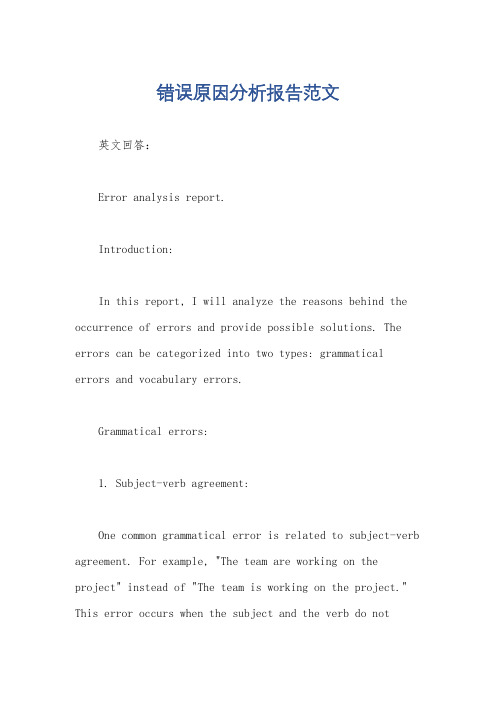
错误原因分析报告范文英文回答:Error analysis report.Introduction:In this report, I will analyze the reasons behind the occurrence of errors and provide possible solutions. The errors can be categorized into two types: grammaticalerrors and vocabulary errors.Grammatical errors:1. Subject-verb agreement:One common grammatical error is related to subject-verb agreement. For example, "The team are working on the project" instead of "The team is working on the project." This error occurs when the subject and the verb do notagree in number. To avoid this error, it is important to ensure that the subject and the verb match in terms of singular or plural form.2. Verb tense:Another frequent grammatical error is related to verb tense. For instance, saying "I have seen that movie yesterday" instead of "I saw that movie yesterday." This error occurs when the wrong tense is used to describe a past event. To avoid this error, it is crucial to use the correct past tense form when referring to a specific time in the past.Vocabulary errors:1. Word choice:One common vocabulary error is related to word choice. For example, saying "I am very exciting about the trip" instead of "I am very excited about the trip." This error occurs when the wrong word is used to express a certainfeeling or emotion. To avoid this error, it is important to choose the appropriate word that accurately conveys the intended meaning.2. Idioms and phrasal verbs:Another frequent vocabulary error is related to idioms and phrasal verbs. For instance, saying "I will call you back in a minute" instead of "I will get back to you in a minute." This error occurs when the wrong idiom or phrasal verb is used in a certain context. To avoid this error, it is essential to learn and understand the correct usage of idioms and phrasal verbs.Conclusion:In conclusion, the errors analyzed in this report are primarily grammatical errors and vocabulary errors. These errors can be avoided by paying attention to subject-verb agreement, verb tense, word choice, and idioms/phrasal verbs. By being mindful of these aspects and practicing their correct usage, one can improve their language skillsand reduce the occurrence of errors.中文回答:错误原因分析报告。
如何在Word文档中使用拼写和语法检查功能
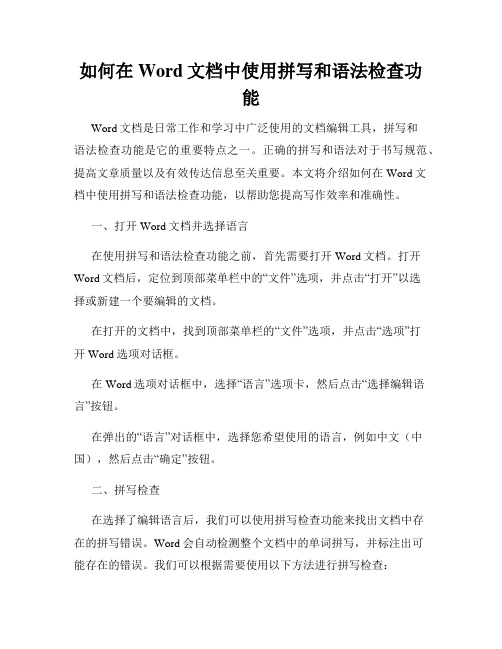
如何在Word文档中使用拼写和语法检查功能Word文档是日常工作和学习中广泛使用的文档编辑工具,拼写和语法检查功能是它的重要特点之一。
正确的拼写和语法对于书写规范、提高文章质量以及有效传达信息至关重要。
本文将介绍如何在Word文档中使用拼写和语法检查功能,以帮助您提高写作效率和准确性。
一、打开Word文档并选择语言在使用拼写和语法检查功能之前,首先需要打开Word文档。
打开Word文档后,定位到顶部菜单栏中的“文件”选项,并点击“打开”以选择或新建一个要编辑的文档。
在打开的文档中,找到顶部菜单栏的“文件”选项,并点击“选项”打开Word选项对话框。
在Word选项对话框中,选择“语言”选项卡,然后点击“选择编辑语言”按钮。
在弹出的“语言”对话框中,选择您希望使用的语言,例如中文(中国),然后点击“确定”按钮。
二、拼写检查在选择了编辑语言后,我们可以使用拼写检查功能来找出文档中存在的拼写错误。
Word会自动检测整个文档中的单词拼写,并标注出可能存在的错误。
我们可以根据需要使用以下方法进行拼写检查:1. 自动拼写检查:Word会在您输入时实时检测拼写错误并用红色下波浪线标记出来。
您可以在标记处右键单击,选择正确的拼写,或者忽略该错误。
2. 手动拼写检查:如果您希望对整个文档进行拼写检查,可点击顶部菜单栏中的“审阅”选项卡,然后点击左侧的“拼写和语法”按钮。
在打开的拼写和语法对话框中,Word会自动定位到第一个拼写错误的地方,并提供可能的更正选项。
您可以根据需要选择合适的更正选项,或者点击“忽略”按钮跳过该错误。
根据需要,您可以继续点击“下一个”按钮,Word会依次提供下一个拼写错误的修正选项。
完成检查后,点击“完成”按钮关闭对话框。
三、语法检查除了拼写检查,Word还提供了语法检查功能,可以帮助我们找出文档中存在的语法错误。
使用语法检查功能可以提高文章质量和写作准确性。
以下是如何使用语法检查功能的步骤:1. 打开语法检查:在打开的文档中,点击顶部菜单栏中的“审阅”选项卡,然后点击左侧的“拼写和语法”按钮。
在Word2007中可以指定是否...
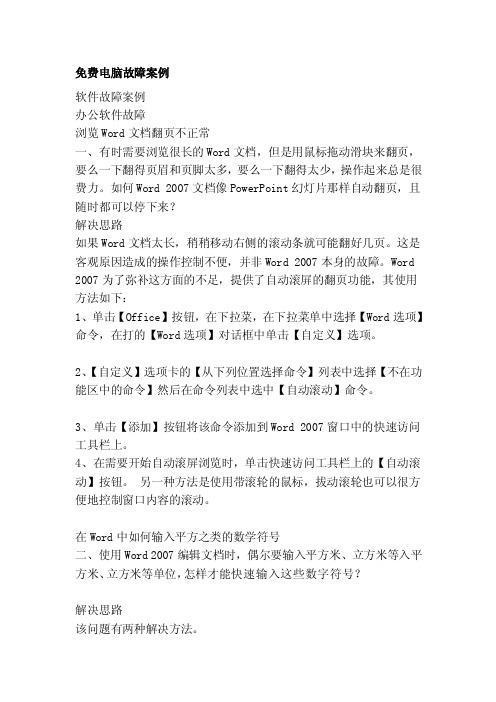
免费电脑故障案例软件故障案例办公软件故障浏览Word文档翻页不正常一、有时需要浏览很长的Word文档,但是用鼠标拖动滑块来翻页,要么一下翻得页眉和页脚太多,要么一下翻得太少,操作起来总是很费力。
如何Word 2007文档像PowerPoint幻灯片那样自动翻页,且随时都可以停下来?解决思路如果Word文档太长,稍稍移动右侧的滚动条就可能翻好几页。
这是客观原因造成的操作控制不便,并非Word 2007本身的故障。
Word 2007为了弥补这方面的不足,提供了自动滚屏的翻页功能,其使用方法如下:1、单击【Office】按钮,在下拉菜,在下拉菜单中选择【Word选项】命令,在打的【Word选项】对话框中单击【自定义】选项。
2、【自定义】选项卡的【从下列位置选择命令】列表中选择【不在功能区中的命令】然后在命令列表中选中【自动滚动】命令。
3、单击【添加】按钮将该命令添加到Word 2007窗口中的快速访问工具栏上。
4、在需要开始自动滚屏浏览时,单击快速访问工具栏上的【自动滚动】按钮。
另一种方法是使用带滚轮的鼠标,拔动滚轮也可以很方便地控制窗口内容的滚动。
在Word中如何输入平方之类的数学符号二、使用Word 2007编辑文档时,偶尔要输入平方米、立方米等入平方米、立方米等单位,怎样才能快速输入这些数字符号?解决思路该问题有两种解决方法。
第一种方法:1、打开【插入】选项卡,在【符号】组中单击【符号】按钮,在下拉列表中,单击【其他符号】按钮。
2、在打开的【符号】对话框中选择【符号】选项卡,在【字体】下拉列表中,选择【(普通文本)】选项,在【子集】下拉列表中选择【拉丁语—1 增补】选项。
这样就可以在下面的符号列表中找到指数符号“2”或“3”,然后单击【插入】按钮即可。
第二种方法:1、例如要插入6的2次方,分别输入数字6和2,然后选中2。
2、在【开始】选项卡的【字体】组中单击按钮,或者按【Ctrl+Shift++】组合键。
100个英语单词练习题

100个英语单词练习题### English Vocabulary Practice Exercises1. Fill in the Blanks- The weather was extremely __________ (adjective for very hot) today.- She was __________ (adjective for not being able to stop crying) at the news of her friend's accident.2. Synonyms and Antonyms- Synonym for "joyful": __________ (adjective)- Antonym for "bright": __________ (adjective)3. Word Forms- Adjective form of "act": __________ (adjective)- Plural form of "child": __________ (noun)4. Rewrite the Sentences- Original: The cat is under the table.Rewrite: Beneath the table, the cat is hiding.5. Use the Word in a Sentence- Word: "Innovative"Sentence: __________6. Crossword Puzzle- Across: 1. A person who is very careful (4 letters)- Down: 2. To make something new (7 letters)7. Word Association- Start with the word "education". What word comes to mind? __________8. Multiple Choice Questions- Which word best completes the sentence: "The __________of the new policy was met with mixed reactions"?A) ImplementationB) InventionC) IntroductionD) Execution9. Fill in the Gaps with Phrasal Verbs- The company is looking to __________ up its marketing strategies.- She __________ out of the room when she heard the news.10. Idiom or Phrase Completion- To __________ in the deep end (Meaning: to start a situation without any preparation)- To __________ the ball rolling (Meaning: to start something)11. Pronunciation Practice- Word: "Schedule" - Pronounce it as: /ˈʃed.juːl/- Word: "Library" - Pronounce it as: /ˈlaɪ.breɪ.ri/12. Grammar Focus - Tenses- Write a sentence in the past perfect tense using the word "had".- Write a sentence in the future perfect tense using the word "will have".13. Word Origins- What language does the word "algorithm" come from?__________14. Homophone Puzzle- Which word is spelled correctly: "Their", "There", or "They're"?15. Context Clues- The word "flourish" in the context of a plant growing well can be replaced with: __________16. Prefixes and Suffixes- What is the prefix of "unbelievable"? __________17. Compound Words- Combine "fire" and "fighter" to form a compound word: __________18. Spelling Bee- Correctly spell the following words: "accommodation", "rhythm", "separate".19. Word Transformations- Transform "care" into a noun that means "a feeling of worry": __________20. Sentence Transformation- Transform the following sentence from active to passive: "The teacher will give the students a test."21. Famous Quotes- Fill in the blank with the correct word: "The only wayto do great work is to __________ what you do." - Steve Jobs22. Word Choice- Choose the best word to complete the sentence: "The__________ of the old building was a sad sight."A) DemolitionB) ConstructionC) RestorationD) Inhabitation23. Collocations- The correct collocation with "make" is: "make an__________" (noun for a formal request)24. Word Analogies- Teacher: Student :: Doctor: __________25. Homophones in Context- Choose the correct homophone in context: "She knew the__________ of the car was expensive." (A) knew, (B) new26. Prefixes and Suffixes in Context- The word "unseen" has the prefix "un-" and means:__________27. Word Families- What are the verb, noun, and adjective forms of "act"?28. Homoglyphs- What is the difference between "their", "there", and "they're"?29. Word Definitions- Define the word "pragmatic".30. Sentence Completion- The __________。
Grammar & Word Choice - Verbs

• As you know, a verb tells what the subject is doing or what is being done to the subject
Verb Tenses
The examples before were used with regular verbs which means they fit the pattern of adding -ed at the end I walk, I am walking, I walked, I have walked Trouble happens when the verbs are irregular and don’t follow the –ed pattern at the end I take, I am taking, I took, I have taken
Past Perfect Tense
The “before before” tense or the double past tense – An action happened before another action
Before I ate your desert, I had eaten a cake. If I had thought about it first, I would not have eaten the cake.
Grammar & Word Choice
Can you be happy and successful without learning grammar?
No! But why?
小学英语作文英语评价表

小学英语作文英语评价表{z}**Elementary English Composition Evaluation Form**---**Student Information:**- Name: ____________________________- Class: ____________________________- Date of Assessment: ________________---**Criteria for Evaluation:**1.**Content (20pts):**- Storyline: Is the story coherent and engaging?- Ideas: Are the ideas clear and creative?- Details: Are there sufficient details to support the main idea?2.**Grammar (20pts):**- Sentence Structure: Does the student use a variety of sentence structures?- Verb tense and agreement: Are verbs correctly tense and in agreement with their subjects?- Punctuation and capitalization: Is the writing punctuated correctly, and are capitalization rules followed?3.**Vocabulary (20pts):**- Word choice: Are words used appropriately and effectively?- Variety: Does the student use a range of vocabulary?- Sentence Fluency: Does the student use interesting words to create fluent sentences?4.**Spelling and Punctuation (15pts):**- Are words spelled correctly?- Is punctuation used correctly, including dialogue and lists?5.**Conventions (10pts):**- Does the student use a title and proper margins?- Are paragraphs used appropriately?- Is the essay organized with an introduction, body, and conclusion?6.**Complete Sentences (10pts):**- Are all sentences complete and well-structured?7.**Handwriting (5pts):**- Is the handwriting legible and neat?---**Total Points: 100pts**---**Evaluator"s Comments:**[Evaluator"s Signature: ____________________]---**Student"s Reflection:**[Student"s Signature: ____________________][Date: ____________________________]---**Note to Teacher:**[Additional comments or feedback for the teacher]---This evaluation form is designed to provide a comprehensive assessment of a student"s English composition skills, focusing on various aspects such as content, grammar, vocabulary, spelling, punctuation, conventions, sentence structure, and handwriting.It aims to encourage students to develop their language skills while providing them with constructive feedback to improve their writing abilities.。
(完整版)WordChoice
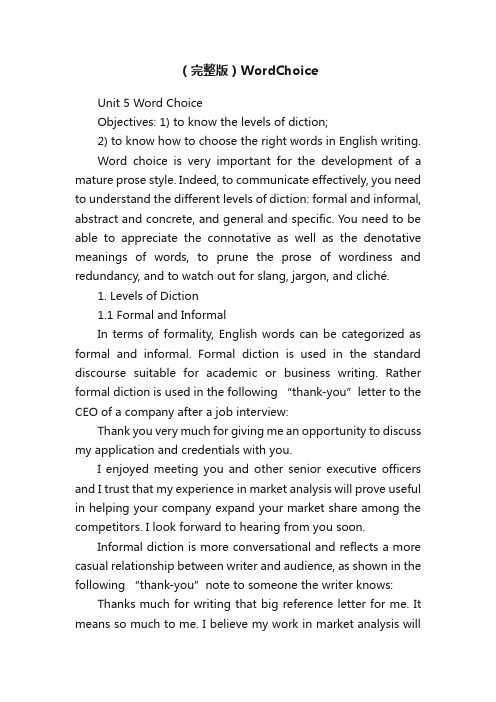
(完整版)WordChoiceUnit 5 Word ChoiceObjectives: 1) to know the levels of diction;2) to know how to choose the right words in English writing.Word choice is very important for the development of a mature prose style. Indeed, to communicate effectively, you need to understand the different levels of diction: formal and informal, abstract and concrete, and general and specific. You need to be able to appreciate the connotative as well as the denotative meanings of words, to prune the prose of wordiness and redundancy, and to watch out for slang, jargon, and cliché.1. Levels of Diction1.1 Formal and InformalIn terms of formality, English words can be categorized as formal and informal. Formal diction is used in the standard discourse suitable for academic or business writing. Rather formal diction is used in the following “thank-you”letter to the CEO of a company after a job interview:Thank you very much for giving me an opportunity to discuss my application and credentials with you.I enjoyed meeting you and other senior executive officers and I trust that my experience in market analysis will prove useful in helping your company expand your market share among the competitors. I look forward to hearing from you soon.Informal diction is more conversational and reflects a more casual relationship between writer and audience, as shown in the following “thank-you”note to someone the writer knows: Thanks much for writing that big reference letter for me. It means so much to me. I believe my work in market analysis willbe quite useful for ATM South. I hope they will consider my application seriously and offer the position to me.If the same job applicant writes to a personal friend about the same topic, the diction used could be even more informal, or colloquial:I’ve got all the right stuff for them at ATM South, Bob, and I wouldn’t be surprised if I get another call form them soon. They must be nuts if they pass me up. Oh, I need this job badly. Wish me luck!In fact, colloquial expressions are quite popular on college campuses in the United States. For example, you may often overhear conversations between a professor and a student somewhat like the one in the following:Student: Hi, prof, do you have a sec?Professor: Hey, Jimmy, what’s up?Student: Well, I was wondering if I’d flunk bio this sem.Professor: What made you worried?Student: I’m having a rough time, you know, with everything going on, and all the courses I’m taking, like psych, lit, stats, phys, ed, and all that stuff.In this conversation, prof stand for professor, sec for second, bio for biology, sem for semester, psych for psychology, lit for literature, stats for statistics, and phys. ed for physical education.Even more informal than colloquialism is slang,a vocabulary of playful but often short-lived “substandard”words and phrases which sometimes carry with them intense vividness and deliberate irreverence (see fuller discussion on the topic in the following).Abbreviations are usually considered as less formal than full forms. Thus sec. is informal, while section is formal; vol. informaland volume formal. Informal style may rely partly on abbreviations, others being contractions and short sentences.The formality or informality of diction or language is not absolute, but relative. Much writing you do everyday is neither exclusively formal nor completely informal. However, you should be aware of and be sensitive to the different levels of formality, choose words that are appropriate to your rhetorical context (subject, audience, and purpose), and try to maintain a consistent level of formality. Check your academic writing for any excessively informal words or phrases. Similarly, check for excessive formality in your informal writing. Strive to keep the level of formality appropriate to the context and consistent in each piece of writing. To use overly formal expressions on a very informal occasion would be no different from wearing suit and tie and shiny leather shoes at a get-together of old friends. Conversely, to use extremely informal or slang expressions on a very formal occasion would be like wearing T-shirts, baggy jeans, and dirty sneakers at a rather fancy weeding party in a five-star hotel. An essay written with a mixture of formal, informal, colloquial, and slang expressions would taste like a drink mixed with expensive French wine and cheap locally brewed beer.The following example may give you a feel of what it would taste like if you mix different levels of diction together: Mr. John Smith proclaims that he is concerned with ecology and the preservation of natural beauty. But he doesn’t give a flip about littering public places. Johnny purchases clothes from the most extravagant store in town yet he is a happy brown bagger when it comes to lunch. I am clueless about this dude; he is full of contradictions.In this short paragraph, the mixture of formal and informalexpressions (Mr. John Smith/Johnny/this dude; is concerned with/doesn’t give a flip) gives it a neither-fish-nor-fowl flavor.Trying to maintain a consistent level of formality may prove particularly challenging for non-native speakers. If you are not sure of the usage of a word or expression, be sure to look it up in an English-English dictionary.More examples:1. 1)My beloved parent has just perished from the earth to his heavenly reward.(吾之先考猝然逾越红尘往受上苍之嘉奖。
必备技能Word文档中的拼写和语法检查
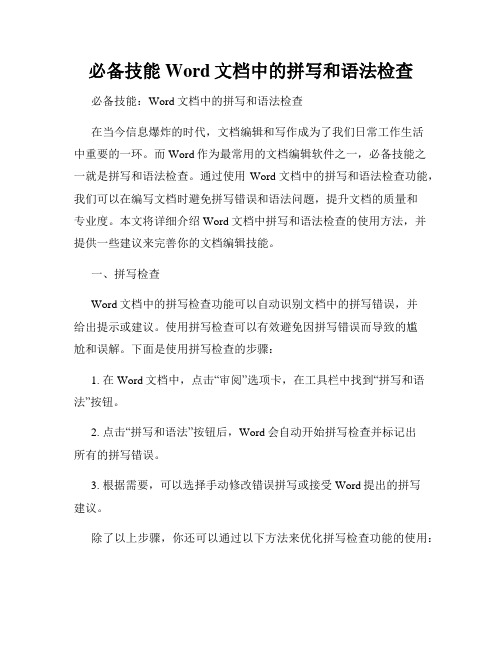
必备技能Word文档中的拼写和语法检查必备技能:Word文档中的拼写和语法检查在当今信息爆炸的时代,文档编辑和写作成为了我们日常工作生活中重要的一环。
而Word作为最常用的文档编辑软件之一,必备技能之一就是拼写和语法检查。
通过使用Word文档中的拼写和语法检查功能,我们可以在编写文档时避免拼写错误和语法问题,提升文档的质量和专业度。
本文将详细介绍Word文档中拼写和语法检查的使用方法,并提供一些建议来完善你的文档编辑技能。
一、拼写检查Word文档中的拼写检查功能可以自动识别文档中的拼写错误,并给出提示或建议。
使用拼写检查可以有效避免因拼写错误而导致的尴尬和误解。
下面是使用拼写检查的步骤:1. 在Word文档中,点击“审阅”选项卡,在工具栏中找到“拼写和语法”按钮。
2. 点击“拼写和语法”按钮后,Word会自动开始拼写检查并标记出所有的拼写错误。
3. 根据需要,可以选择手动修改错误拼写或接受Word提出的拼写建议。
除了以上步骤,你还可以通过以下方法来优化拼写检查功能的使用:- 添加自定义字典:对于某些特定的词汇,拼写检查功能可能会出现误报。
你可以通过添加自定义字典来防止这种情况的发生。
方法是,在工具栏中选择“选项”,在弹出的窗口中选择“校对”,然后点击“自定义字典”按钮,将你希望添加到字典中的词汇逐一添加即可。
- 设置自动拼写检查:Word默认会在你输入时自动进行拼写检查,但如果你想禁用此功能,也可以在工具栏的“选项”中进行设置。
二、语法检查与拼写检查类似,Word文档中的语法检查功能可以自动识别文档中的语法错误,并给出相应的修改建议。
在写作过程中,我们常常会犯一些常见的语法错误,如主谓不一致、时态混乱等。
语法检查功能的使用可以帮助我们找到并修正这些错误,使文档更加规范和易读。
下面是使用语法检查的步骤:1. 在Word文档中,点击“审阅”选项卡,在工具栏中找到“拼写和语法”按钮。
2. 点击“拼写和语法”按钮后,Word会自动开始语法检查并标记出所有的语法错误。
choice的用法和词组

choice的用法和词组解析一、choice的词义和词性choice是一个常用的英语单词,它可以作为名词或形容词使用,具有以下主要的词义和词性:名词选择,抉择,指在多个可能性中做出决定或判断的行为或结果。
例如:It's a difficult choice to make. 这很难抉择。
She's the obvious choice for the job. 她是这个职位最合适的人选。
选择机会,选择权,选择能力,指在一定的条件或范围内可以做出选择的权利或能力。
例如:You have your choice between the two. 在这两个之中,你有选择权。
She doesn't have much choice, really, does she? 她真的没有多少选择的余地了,不是吗?精选品,指经过挑选或优化的高质量的人或物。
例如:The shop was selling choice apples, so I bought 3 pounds. 那商店在卖优等苹果,所以我买了三磅。
To consumers it promises choice, engagement and a low price. 对消费者来说,它承诺的是精选品、质量保证和低价格。
供选择的范围或种类,指可以从中进行选择的多样的人或物。
例如:The menu has a good choice of desserts. 菜单上有多种甜食可供选择。
There wasn't much choice of colour. 可供选择的颜色不多。
形容词优选的,中上级的,指品质或等级较高的人或物。
例如:This is a choice piece of land. 这是一块上等的土地。
They had little choice but to agree to what he suggested. 他们别无选择,只好接受他的提议。
Word使用技巧使用拼写和语法检查功能
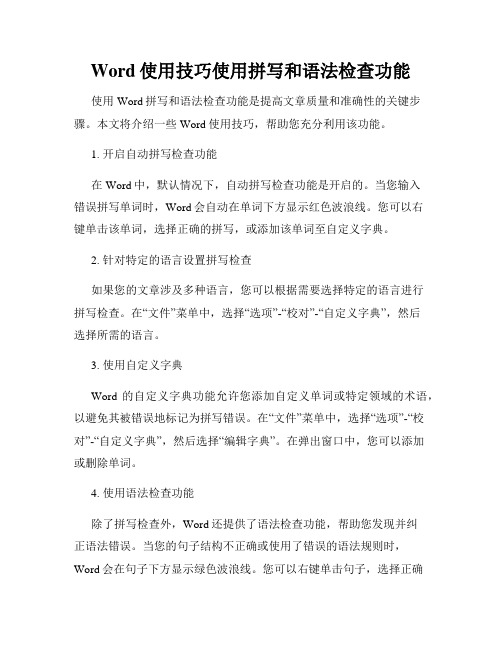
Word使用技巧使用拼写和语法检查功能使用Word拼写和语法检查功能是提高文章质量和准确性的关键步骤。
本文将介绍一些Word使用技巧,帮助您充分利用该功能。
1. 开启自动拼写检查功能在Word中,默认情况下,自动拼写检查功能是开启的。
当您输入错误拼写单词时,Word会自动在单词下方显示红色波浪线。
您可以右键单击该单词,选择正确的拼写,或添加该单词至自定义字典。
2. 针对特定的语言设置拼写检查如果您的文章涉及多种语言,您可以根据需要选择特定的语言进行拼写检查。
在“文件”菜单中,选择“选项”-“校对”-“自定义字典”,然后选择所需的语言。
3. 使用自定义字典Word的自定义字典功能允许您添加自定义单词或特定领域的术语,以避免其被错误地标记为拼写错误。
在“文件”菜单中,选择“选项”-“校对”-“自定义字典”,然后选择“编辑字典”。
在弹出窗口中,您可以添加或删除单词。
4. 使用语法检查功能除了拼写检查外,Word还提供了语法检查功能,帮助您发现并纠正语法错误。
当您的句子结构不正确或使用了错误的语法规则时,Word会在句子下方显示绿色波浪线。
您可以右键单击句子,选择正确的语法选项。
此外,您还可以在“文件”菜单中的“选项”-“校对”-“语法选项”中自定义语法检查的设置。
5. 学习并纠正常见的语法错误Word的拼写和语法检查功能非常强大,但并不能完全解决所有的语法问题。
因此,作为作者,了解常见的语法错误并学会纠正它们至关重要。
例如,了解动词时态的正确用法、主谓一致规则和冠词使用等,将有助于提高文章的语法准确性。
在使用Word拼写和语法检查功能时,以下几点也值得注意:- 不要过度依赖拼写和语法检查功能,仍需自己仔细审查文章。
- 注意不同版本的Word可能会有略微的差异,一些功能的名称和位置可能会有所不同。
- 在使用语法检查功能时,要明确自己的文章语法规范,以避免将正确的语法错误地标记为错误。
总结:Word的拼写和语法检查功能为我们的文章提供了有力的支持。
初中英语考试Word Choice单词选择练习
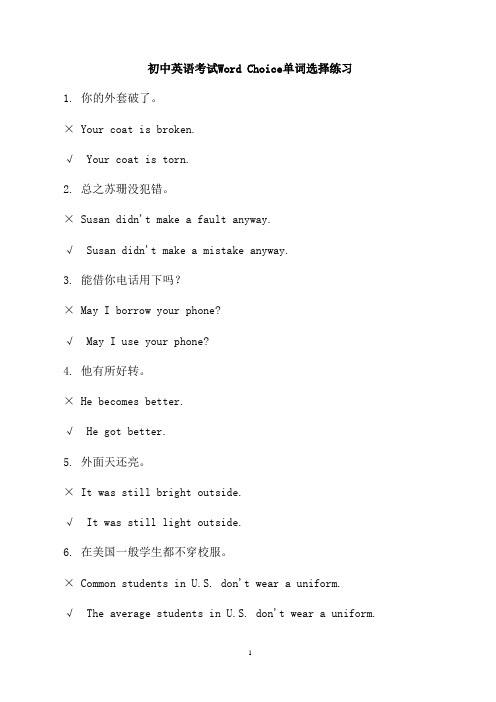
初中英语考试Word Choice单词选择练习1. 你的外套破了。
× Your coat is broken.√ Your coat is torn.2. 总之苏珊没犯错。
× Susan didn't make a fault anyway.√ Susan didn't make a mistake anyway.3. 能借你电话用下吗?× May I borrow your phone?√ May I use your phone?4. 他有所好转。
× He becomes better.√ He got better.5. 外面天还亮。
× It was still bright outside.√ It was still light outside.6. 在美国一般学生都不穿校服。
× Common students in U.S. don't wear a uniform.√ The average students in U.S. don't wear a uniform.7. 这道色拉是谁做的?× Who cooked this salad?√ Who made this salad?8. 让我给你把把脉。
× Let me examine your pulse.√ Let me feel your pulse.9. 我把帽子忘在屋里了。
× I forget my hat in the house.√ I left my hat in the house.10. 你上过大学吗?× Did you attend college?√ Did you go to college?11. 他的体温降下来了。
× His temperature went down.√ His temperature came down.12. 今天的报纸上有他写的关于香港的文章。
word自动拼写和语法检查

word自动拼写和语法检查2005-5-16 3:15:19 来源:本站整理作者:不详【大中小】投递文章内容提要:在输入文本时,很难保证输入文本的拼写、语法都完全正确。
因此,输入后不得不花很大的精力核对文本,查找并改正错误。
Word2000为用户提供了一个很好的拼写和语法检查功能,可以在输入文本的同时检查错误,实...在输入文本时,很难保证输入文本的拼写、语法都完全正确。
因此,输入后不得不花很大的精力核对文本,查找并改正错误。
Word 2000 为用户提供了一个很好的拼写和语法检查功能,可以在输入文本的同时检查错误,实时校对。
为提高输入的正确性提供了很好的帮助。
以往版本只是对英文的拼写和语法提供了足够的拼写和语法检查,对中文的支持不是很令人满意。
在Word 2000 中,已经对中文提供了足够的支持,因为Word 2000 可以根据用户定义的词典来检查输入的词组是否正确。
3.7.1 键入时自动检查拼写和语法错误Word 2000 提供了自动拼写检查和自动语法检查的功能,当文档中无意之中输入了错误的或者不可识别的单词时,Word 2000 会在该单词下用红色波浪线进行标记,如果是出现了语法错误,则在出现错误的部分用绿色波浪线标记。
这时,在带有波浪线的文字上单击鼠标右键,会弹出一个快捷菜单,其中列出了修改建议。
如图3-27 所示。
只要在快捷菜单中单击想要替换的单词,就可以将错误的单词替换为选取的单词。
∙选择【全部忽略】选项,忽略文档中所有该单词的拼写错误。
∙选择【添加】选项,将该单词添加到字典中,Word 以后便不再将该单词编辑为错误。
∙选择【语言】选项,可以选择一门语言。
∙选择【拼写】选项,将显示【拼写】对话框,以便指定附加的拼写选项。
要对文档自动进行语法和拼写的检查,首先需要进行【拼写和语法】选项设置。
操作步骤如下:(1)单击【工具】菜单中的【选项】菜单项,在弹出的【选择】对话框中选择【拼写和语法】选项卡,如图3-28 所示。
Word 标签练习文档 Envelope2 帮助指导
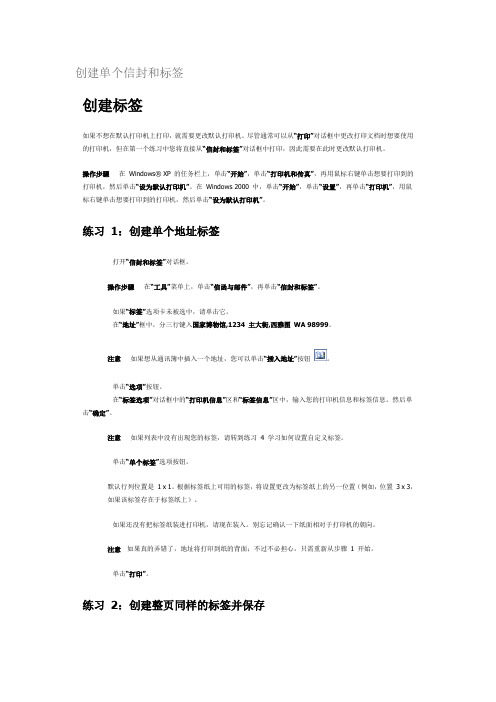
创建单个信封和标签创建标签如果不想在默认打印机上打印,就需要更改默认打印机。
尽管通常可以从“打印”对话框中更改打印文档时想要使用的打印机,但在第一个练习中您将直接从“信封和标签”对话框中打印,因此需要在此时更改默认打印机。
操作步骤在Windows® XP 的任务栏上,单击“开始”,单击“打印机和传真”,再用鼠标右键单击想要打印到的打印机,然后单击“设为默认打印机”。
在Windows 2000 中,单击“开始”,单击“设置”,再单击“打印机”,用鼠标右键单击想要打印到的打印机,然后单击“设为默认打印机”。
练习1:创建单个地址标签1.打开“信封和标签”对话框。
操作步骤在“工具”菜单上,单击“信函与邮件”,再单击“信封和标签”。
2.如果“标签”选项卡未被选中,请单击它。
3.在“地址”框中,分三行键入国家博物馆,1234 主大街,西雅图WA 98999。
注意如果想从通讯簿中插入一个地址,您可以单击“插入地址”按钮。
4.单击“选项”按钮。
5.在“标签选项”对话框中的“打印机信息”区和“标签信息”区中,输入您的打印机信息和标签信息。
然后单击“确定”。
注意如果列表中没有出现您的标签,请转到练习4 学习如何设置自定义标签。
6.单击“单个标签”选项按钮。
默认行列位置是1 x 1。
根据标签纸上可用的标签,将设置更改为标签纸上的另一位置(例如,位置3 x 3,如果该标签存在于标签纸上)。
7.如果还没有把标签纸装进打印机,请现在装入。
别忘记确认一下纸面相对于打印机的朝向。
注意如果真的弄错了,地址将打印到纸的背面;不过不必担心,只需重新从步骤 1 开始。
8.单击“打印”。
练习2:创建整页同样的标签并保存1.打开“信封和标签”对话框。
2.如果“标签”选项卡未被选中,请单击它。
3.在“地址”框中,删除框中任何已存在的信息并键入“易碎物品”。
4.选择词语“易碎物品”并用鼠标右键单击;再单击“字体”,将字号更改为26,然后单击“确定”。
怎样在Word2013中检查英文拼写和语法错误

怎样在Word2013中检查英文拼写和语法错误
在Word2013文档中,用户经常可以看到在某些单词或短语的下方标有红色、蓝色或绿色的波浪线。
这是由Word2013中提供的“拼写和语法”检查工具根据Word2013的字典标示出的含有拼写或语法错误的单词或短语。
其中红色和蓝色波浪线表示单词或短语含有拼写错误,而绿色波浪线表示语法错误(仅是一种修改建议)。
下面随店铺一起看看吧。
Word2013检查英文拼写和语法错误的使用步骤
第1步,打开Word2013文档窗口,如果看到该Word文档中包含有红色、蓝色或绿色的波浪线,说明Word文档中存在拼写或语法错误。
切换到“审阅”功能区,在“校对”分组中单击“拼写和语法”按钮,如图2013080405所示。
图2013080405 单击“拼写和语法”按钮
第2步,打开“拼写检查”任务窗格,根据任务窗格中的拼写检查提示确认所标示出的单词或短语是否确实存在拼写或语法错误。
如果确实存在错误,则根据提示单击“更改”按钮即可。
如果标示出的单词或短语没有错误,可以单击“忽略”或“全部忽略”按钮忽略关于此单词或词组的修改建议。
也可以单击“添加”按钮将标示出的单词或词组加入到Word2013内置的词典中,如图2013080406所示。
图2013080406 根据拼写检查建议更改内容
第3步,完成拼写和语法检查后将直接关闭“拼写检查”任务窗格。
关于Word2013检查英文和语法错误的相关文章推荐:。
WordNet2.1 功能简介
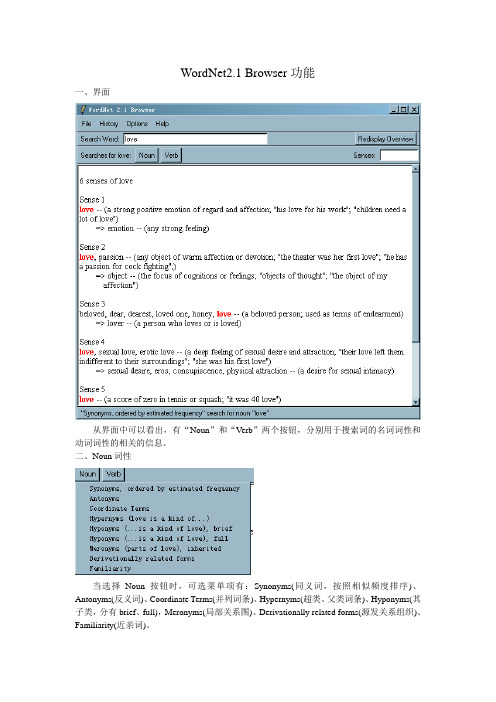
love, passion -- (any object of warm affection or devotion; "the theater was her first love"; "he has a passion for cock fighting";)
=> object -- (the focus of cognitions or feelings; "objects of thought"; "the object of my affection")
*> Somebody ----s something
*> Somebody ----s somebody
Sense 2
love, enjoy -- (get pleasure from; "I love cooking")
EX: They love him to write the letter
Sense 3
HAS PART: trait -- (a distinguishing feature of your personal nature)
HAS PART: character, fiber, fibre -- (the inherent complex of attributes that determine a persons moral and ethical actions and reactions; "education has for its object the formation of character"- Herbert Spencer)
love -- (be enamored or in love with; "She loves her husband deeply")
在Word中查找和替换名词、形容词的各种形式或动词的各种时态

查找和替换名词、形容词的各种形式或动词的各种时态
您可以搜索:
名词的单数和复数形式
例如,在将“apple”替换为“orange”的同时,将“apples”替换为“oranges”。
所有形容词形式
例如,在将“worse”替换为“better”的同时,将“worst”替换为“best”。
动词词根的所有时态
例如,在将“sit”替换为“stand”的同时,将“sat”替换为“stood”。
1.单击“编辑”菜单中的“查找”或“替换”命令。
2.如果看不到“查找单词的各种形式”复选框,请单击“高级”按钮。
3.选中“查找单词的各种形式”复选框。
4.在“查找内容”框中输入要查找的文字。
5.如果要替换该文字,请在“替换为”框中输入替换文字。
6.单击“查找下一处”、“替换”或者“全部替换”按钮。
7.如果替换文字不明确,请单击与所需含义最匹配的单词。
例如,“saw”可以是名词也可以是动词,单击“saws”以替换名词;单击“sawing”以替换动词。
其他形容词的各种形式或动词的各种时态替换,读者可以动手试试。
注意:
·替换文字时最好使用“替换”按钮,而不要用“全部替换”按钮,这样可以确认每一处替换,以免发生错误。
·查找和替换文本时,应使用相同的词性和时态,例如,可以搜索“see”,并将其替换为“observe”(两者都是一般现在时的动词)。
- 1、下载文档前请自行甄别文档内容的完整性,平台不提供额外的编辑、内容补充、找答案等附加服务。
- 2、"仅部分预览"的文档,不可在线预览部分如存在完整性等问题,可反馈申请退款(可完整预览的文档不适用该条件!)。
- 3、如文档侵犯您的权益,请联系客服反馈,我们会尽快为您处理(人工客服工作时间:9:00-18:30)。
Word choiceVerbsUse the higher level verbs to replace your simple ones1.ThinkAssume/deem/ recon/consider/deliberate/speculate/suggest/fancy/conceive/imagine Meditate/contrive/infer/presume/suppose/predicate2.DoMake/conduct/commit/implement/execute/exercise/perform/fufill/realize/undertake/assume Tackle/handle/dispose/accomplish/succeed/proceed/engage3. MakeManufacture/produce/assemble/elaborate/refine/forgeborToil/suffer/undergo/assume/burden4.ChangeInnovate/reform/update/develop/grow/alter/evolve/transform/vary/diversify5.knowAcquaint/apprehend/comprehend/make sense of /realize6.Harm/HurtSpoil/damage/destroy/impair/devastate/wreck/ruin/vitiate/perish/demolish/decline/deteriorate/ Corrode/erode/raze/wreck7.Teach/Cultivate/foster/develop/nourish/nurture/uprear/coachedfy/tutor/enlighten/educate8.Help/saveRescue/relieve/shield/guard/safeguard/defend/escort/alleviate/cease/abate/avail/assist Comfort/soothe/pacify/console/subside9.Love/LikeCharm/enjoy/enchant/fascinate/prefer/appeal/attract/fancy/adore/captivate/rapture/rejoice 10.pushPromote/propel/impel/prompt/stimulate/accelerate/urge/drive/inspire/evoke/activate/mobilize 11.Quit/Give upDecline/abandeon/reject/discard/forsake/recant/yield/relinquish/resign/waive/object12.SayClaim/assert/allege/announce/declare/proclaim/profess/relate/13.ShowImply/hint/expose/reveal/indicate/embody/display/denote/describe/mensifest/signify/suggest Demonstrate/illustrate/implicate/advocate/portray/depict/expound/represent14.ObeyAbide/comply/summit/yield/observe/conform/cater/correspond/defer/15.ProgressFlourish/abound/teem/boom/thrive/advance/stride16.TroubleBother/plague/harass/frown/irritate/provoke/frustrate/dismay/afflict/agonize/annoy/embarrassVex/hassle/ torment17.Want/HopeLong/ desire/ expect/hunger/ thirst /crave/yearn/pine/hanker18.Urge/pressStimulate/ rouse/arouse/awaken/enlignten/inspire/motivate/spur/ignite/actuate/activiate/provoke 19.focus/pay attention toCenter on/pinpoint/concentrate/spotlight/fix20.attractAppeal/enchant/charm/fascinate/ captivate/enthrall/bewitch21.speed upAccelerate/ quicken/ spur/gallop/expedite/facilitate/eEmploy/ engage/apply/exploit/utilize/make use of/avail oneself of/ take advantage of/trade on 23.shockHorrify/terrify/appall/frighten/ dismay/scare/24.decideDetermine/ settle/ choose/opt/commit oneself to/resolvepeteRival/emulate/match/contend/vie26.Stand/ BearPut up with/withstand/tolerate/endure/weather27.puzzleConfuse/bewilder/perplex/confound/disorient/baffle/mystify28.FreeLiberate/release/loose/deliver/unbind/unshackle/emancipate/manumit29.Mix/Blend/combine/compound/mingle/meld/merge/30. Call offCancel/abort/revoke/abolish/repeal/abate/terminate/dissolve31. Bear/Put up withStand/tolerate/endure/withstand/weather32. EnableEmpower/invest/endow/entitle/authorize/capacitate/reinforce33. AdaptAdjust/accommodate/orient/acclimate/habituate/gear34. Bring upDevelop/feed/cultivate/educate/nourish/forster/maintain/sustain/breed/edify35. PollutePoison/blemish/blot/contaminate/stain36. AppearEmerge/arise/surface/37. DisappearVanish/evaporate/disperse/fade away38. ValueCherish/treasure/prize/appreciate/hold dear39. StopPrevent/prohibit/discourage/block/retard/hamper/deter/obstruck/arrest/baffle/obstruct 40. PromisePledge/assure/ensure/guarantee/warrant/commit41. outdo/overrunExceed/surpass/transcend/surmount/excel42. Join / take part inPlunge into/participate in/engage in/be occupied with/be involved in/apply oneself to/NounsAbortion Absence Access Accordance Accuracy Attempt Aptitude Arrival Advent Adversity Agony Appeal Approval Assumption Assurance Assistance Ambition Adventure Application Approach Adour Aspiration Anticipation Awareness Addiction Awe Barrier Bias Boom Breakdown Challenge Charm ConcernContemptConventionConvenienceConsciousnessConsequenceCuriosityCharityCompromiseComplaintCompetitionContributionConflictConsumptionCommitmentCollapseCorruptionConceptionConsiderationConscienceConquestConcentrationClimax/zenithDisciplineDeclineDepartureDedicationDignityDilemmaDeceitDeterminationDespairDepressionDamageDelightDismayEndeavorEmphasisEmbryoEmergencyEmbarrassmentEnduranceEnlightenmentEncouragementEvolutionEnthusiasmEntertainmentEssenceExhaustionExpenseExpenditureEcstasyExposureExploitationFatigueFacultyFeedbackFascinationFlourishFrustrationGuidanceGratitudeGuaranteeHospitalityHumanity HumilityHostilityHazardHarmony Ignorance IlliteracyIllusionImpulseImpetus InnovationInsightInitiative Influence InspirationImpactImpulsion IntegrityIndignityIntellectIntension Intelligence Infancy Innocence IsolationJealousyJusticeKnackKernelLanguorLackLeadership LegendLiability Likelihood Limitation/limit LustLuxuryLayoutLiteracy Maximum/minimum Materialism MilestoneMisery ModernizationMoralityMotiveMiracleMaintenanceMisfortuneMischiefMultitudeMoanMaliceManiaMarvelMeasureMiniatureMirageMythMysteryNightmareNecessityNoveltyObedienceObligationOriginalityObsessionOccupationOccurrenceOpportunityOptionPossibilityPatriotismPersistencePopularityPossessionPovertyPreparationPreferencePrejudicePremisePrivilegePrestigeProspectPropertyProtestPriorityProficiencyPurposePursuitRecessionRealmResponseReliefRitualResolutionResistanceRomanceRenaissance/revivalRealizationRevengeRenownRelianceSacrificeSecrecySchemeSecurityScrutinySpectacleSimilarityShortageSignificanceStrategySuperioritySymposiumTackTacticsTendencyTemptationThresholdThriftyTriumphUrgencyVitalityVarietyViolenceVigourWelfareWarrantYieldZeal/ZestAdjectiveAuthenticAncientAbundant Appropriate Available/accessible Amazing/astonishing BeneficialFeasibleModerate Prominent RenownedAlmightyGeniusVersatileAgileBriskVigorousEnergeticDynamicIgnorantExhaustedWearyFeebleDelicateSubtleVulgar TransparentFertileExuberantOrthodoxSevere/stern Inevitable/unavoidable Indispensable Specific/concrete Bizarre/queer CuriousFantastic Marvelous/awesome RomanticComplex/complicated Intricate Convincing/persuasive MysteriousPotentialCapableObscureVagueFortunateFuriousSheerRigid/stiffPermanentEternalConstantContinuous/continualFlexibleFragileCrispTangibleExoticMassiveTransientTemporaryNeighboringInherent/inbornSuperiorInferiorSupremeProfoundSuperficialSubordinateEnormousGiantInfiniteMultipleNumerousFrequentRegularVariousDiversifiedAmpleSufficientEffectiveEfficientDevoidInadequateChaosFutileSterileBarrenBleakIsolatedAloofSolitaryArduousThorny/troublesomeVainPrevailing/PrevalentVogueFashionablePreviousPriorFormalPromisingPrimaryOriginalInitialSubsequentCrucial/criticalUrgentAbruptMasculineFeminineDomesticSecularRoyalIllegalRural/urbaneInvincibleIrresistibleIronicIncredibleDevoted/dedicatedPiousPastoralAppetizingAppealing/fascinating Charming/pleasing DisgustedAddictedBrilliantRadiantSplendidMagnificentMajesticGloomyDepressedFrustratedRelevantSimilarFamiliarExtravagant/luxurious LavishEnthusiastic/zealous Placid/sereneTranquilPrecise/accurate ConciseAnnoyingPuzzlingConfusedPerplexed Overwhelming DominatePrincipalEnduring/lasting Delicate/frailFierce/violentSavage Distinguished CelebratedEminentNotoriousPrecious/valued Prolific/productive Hesitant/reluctant Apparent/manifest Partial/biased/prejudiced Influential/infectious Considerate/thoughtful Prohibited/forbidden Qualified/competent ProsperousThriving/flourishing Tedious/fatiguing Comfortable/soothing Enduring/tolerant Disastrous EquivalentEnsuingEloquent Enterprising EnjoyableEthicEthnic Unprecedented Appalling/hideous Cautious/prudent/wary DecisiveHeroicPatriotic Tremendous Economical/economic。
